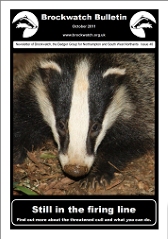Problems cause by badgers
From time to time badgers do cause various problems for gardeners and landowners. These include:
 Damage to lawns, bowling greens and golf courses. This is usually caused by badgers digging small holes or lifting up turf while foraging for cranefly larvae (leatherjackets), cockchafer larvae or other grubs (see photo). It tends to happen more often during prolonged periods of dry or freezing weather, when it is difficult for badgers to find earthworms (their normal staple diet).
Damage to lawns, bowling greens and golf courses. This is usually caused by badgers digging small holes or lifting up turf while foraging for cranefly larvae (leatherjackets), cockchafer larvae or other grubs (see photo). It tends to happen more often during prolonged periods of dry or freezing weather, when it is difficult for badgers to find earthworms (their normal staple diet).
Damage to cultivated fruits, sweetcorn, root crops or bulbs. Again, this problem tends to be more pronounced during periods of dry weather when badgers have difficulty finding earthworms, and raid farms and gardens to survive.
Making holes in or under fences. Badgers are creatures of habit and follow regular pathways. If a fence is put up across such a path, badgers may dig a hole underneath it or even break through it.
Digging burrows under buildings, tracks, roads etc. Occasionally badgers will dig setts in places where they are likely to cause serious problems.
Predation on livestock. This is very rare. Over the years we have received only a very small number of reports of badgers taking poultry. These incidents have involved badgers affected by prolonged dry weather, or in one case an injured animal which took refuge in a hen house and was accidentally shut in with the chicken and her young overnight. Like foxes, badgers will feed on carcases of dead lambs. Predation on live lambs by badgers is very uncommon in Britain, and we are not aware of any confirmed reports of this happening locally. Lamb killing, when it occurs, is more likely to be the work of a stray dog than a badger (or a fox for that matter).
Predation on pets. This is exceptionally rare. Of the very small number of cases we are aware of, none have happened locally. It is very unlikely that a badger would attack a cat (most cats would be agile enough to escape anyway). In fact we have read a number of accounts of badgers and cats feeding together amicably.
Information and advice
In situations where people cannot tolerate damage caused by badgers (or wait for the weather to change!), it is almost always possible to resolve the problem without harming the animals. Where badgers are unwelcome there are ways of deterring them or physically excluding them. In some circumstances (where setts are involved for example) a licence may be needed from the Wildlife Management & Licensing unit (previously part of DEFRA but now transferred to Natural England).
Here are some useful sources of information and advice:
Badgers in your garden – a useful booklet (in PDF format) from the Badger Trust. Paper copies of the booklet are available from Brockwatch on request.
Advice on resolving problems caused by badgers – a host of useful information including links to PDF documents aimed at householders, landowners and foresters.
Steve Jackson’s Badger Pages – includes several pages with information on problems caused by badgers, and solutions to those problems. See:
Badger problems – homes and gardens
Badger problems – golf courses and bowling greens
Badger problems – agricultural and horticultural situations

